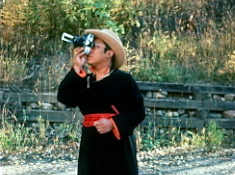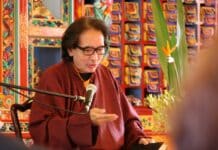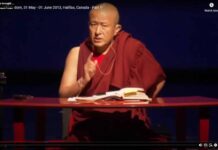
One of the characteristics of a bodhisattva is an absence of self-interest and self-importance. The Vidyadhara Chogyam Trungpa Rinpoche was a fully accomplished bodhisattva, and his teachings and life example can be contemplated and viewed as a display about how to live one’s life outside the thick walls of personal and cultural fabrication, and free from the sometimes bizarre political machinations of ego.
In the field of intercultural studies and anthropology, an often-used term is ethnocentrism. This refers to the common human trait of valuing one’s own culture above all others, and viewing one’s cultural assumptions and constructs as natural, correct and normal. Although such a tendency may be seen as somewhat harmless, the next logical extension of this habit of culture is that the “other,” and their customs and mores, can be seen as unnatural and abnormal. This impulse diminishes one’s ability to communicate and connect with those who are different from us, and is one of the root causes of aggression and small-mindedness.
The Vidyadhara grew up in a remote region within a remote country. He had very little contact with other cultures beyond his own, until he fled Tibet at age 20, and came to India and the West. But even though his contact with other cultures was very limited during his years in Tibet, he somehow broke free of his cultural heritage as he began teaching in the West. He managed to relate and connect with people in the West—and in Asia—on their own ground, and within the particular context of their cultural norms and values, not just his own.
This unusual intercultural competence is one of the key reasons why the Vidyadhara was able to communicate so completely and skillfully with people from many different backgrounds. Although he never ceased to take pride in his Tibetan ancestry and lineage, his particular cultural package—his “Tibetan-ness”—did not burden him as excess baggage. In taking on students in the West, he did not impose his own culture upon them, and try to get them to be neo-Tibetans in Western clothing. Although he drew from the deep well of his own cultural experience and background, he was free of cultural constraints, and was able to connect with the wisdom and richness in the many different cultures he encountered.
In his book, Magic Dance, Thinley Norbu Rinpoche has a verse that artfully illustrates this broad and unbiased cultural understanding and view:
There is no communication in relative truth
without understanding everyone’s system and idea,
so may I adapt to everyone’s system, wishing everyone’s benefit.
There is no liberation in absolute truth
without release from everyone’s system and idea,
so may I adapt to no one’s system,
beyond benefit’s wish.
In December 1981, the Vidyadhara was in India, with a delegation from Shambhala, for the funeral ceremonies of His Holiness the Sixteenth Gyalwang Karmapa. Following the party’s visit to the rites at Rumtek Monastery in Sikkim, we had a day or two to catch our breath in New Delhi before coming home. One night after dinner, the Vidyadhara and friends were strolling through the hotel, when he spotted a Hindu wedding ceremony in progress. He took a keen interest in the ceremony (a fire puja) and spent more than an hour sitting and just watching the proceedings. He said very little, but it was clear that he found deep enjoyment and appreciation in the Hindu rites, and had the highest respect for the culture of India.
This appreciation of cultures manifested in many different ways, and included intense and deep connections with Native Americans, as well as Japanese and British cultures. Each year when we were preparing to send out personal Tibetan New Year’s greetings from the Vidyahara to his friends around the world, he would always remind us: “Don’t forget to send a card to my old mailman in Scotland.” This deep affection and personal interest in others and their cultures was a striking example of how a bodhisattva engages the world without pretense and without rigid boundaries.
This genuine interest in how humans lived their lives—combined with an irreverent sense of humor about their foibles and eccentricities—gave the Vidyadhara the ability to communicate and connect with almost anyone at almost any time. I am grateful for this example, and celebrate and contemplate this aspect of the glorious guru on the occasion of the 20th anniversary of his parinirvana.










